Amid prolonged drought, sisters in Kenya fend off starvation in pastoral villages
Pictured left: Sr. Jannifer Hiuhu hands over food rations to Chepokoronto Lotingora, a 33-year-old mother of eight. After a fie destroyed Lotingora’s former home and claimed two of her children, the Incarnate Word Sisters helped her rebuild her home and provided her with food to sustain her family. (GSR photo/Wycliff Peter Oundo)
As dawn breaks in this northern Kenyan village, Sr. Jannifer Hiuhu of the Incarnate Word Sisters begins to deliver food to her neighbors before braving rocky terrains, scorched bushes, and dry riverbeds along these remote, bandit-infested Rift Valley roads. In a four-by-four truck, she is on a mission to supply rations to other starving families in Sugut, a semiarid village in Baringo County.
Hiuhu and other religious sisters in this isolated part of northern Kenya deliver food weekly to hungry families across various villages to save them from starvation. The sisters receive food donations and other relief items from congregants and people of goodwill.
One of the beneficiaries, Cheposolowitch Akoler, lives about two miles from the sister’s convent in Rotu. She moved to Rotu two years ago, fleeing her drought-ravaged hometown in West Pokot, a neighboring county. She said some of her former neighbors had died from hunger, prompting her to migrate to Rotu.
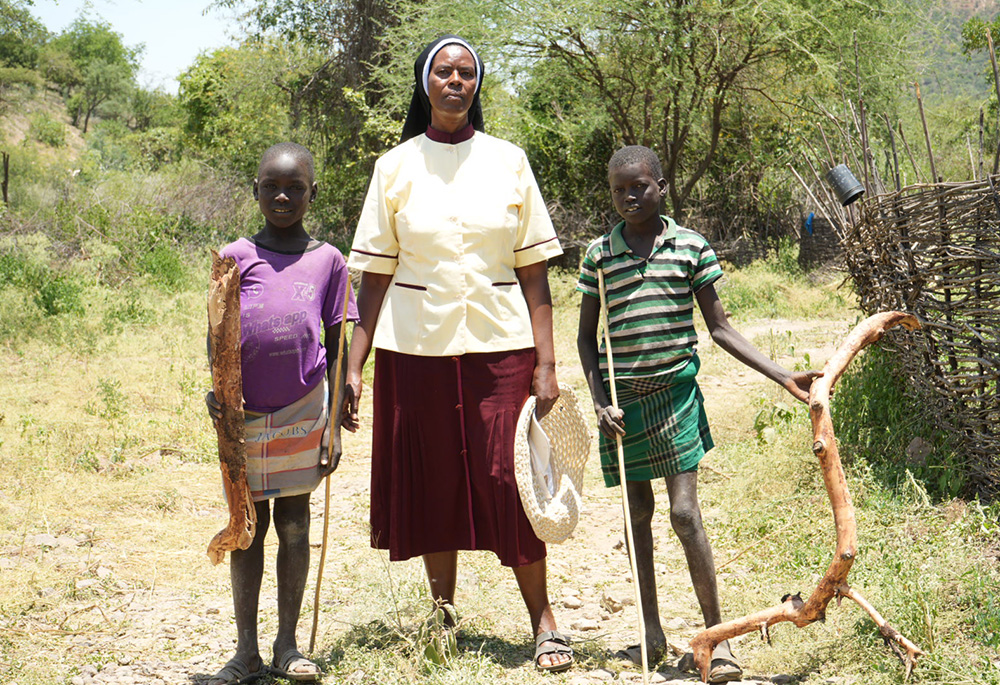
Incarnate Word Sr. Jannifer Hiuhu, a community leader at the Rotu Mission, welcomes two children bearing firewood as gifts at her congregation’s mission center. The firewood will be used to cook porridge, which is provided daily to all children in the village as part of the sister’s effort to combat hunger and improve nutrition among the most vulnerable in rural East Pokot. (GSR Photo/Wycliff Peter Oundo)
“I came here after I heard the church and the sisters were providing food rations,” said the 46- year-old mother of 11. “We had ten camels and other livestock, but suddenly, I was diagnosed with a stomach illness, and shortly afterward, a terrible famine struck our village. I sold most of my flock and nine camels to foot the medical bills and spared one camel to provide milk for my children, but it died during the drought.”
When she arrived in Rotu, Akoler was received by the sisters, who have been taking care of her and her family. “I could not provide for my children and family,” she said, grabbing Hiuhu’s hands in gratitude. “My family would have starved to death if the sisters had turned me away.”
Northern and eastern Kenya’s most arid and semiarid lands have experienced three severe droughts in the last decade. The ongoing drought since 2020 has been the most severe and prolonged, resulting in loss of lives, widespread livelihood losses, and massive displacement of people.
Akoler is among hundreds of thousands of Pokot people and others in northern Kenya who are receiving food and relief items from religious sisters and partners to help them survive. Pokot people — who live in West Pokot County and Baringo County — are a nomadic pastoralist community that relies on livestock, mostly goats, camels and cattle, for their livelihoods.

Sr. Jannifer Hiuhu with Cheposolowitch Akoler and her husband in front of their hut, clad in traditional ceremonial regalia. Despite being nomadic, Akoler’s family has settled in Rotu village due to the providence of the Incarnate Word Sisters in their mission to combat hunger and elevate the living standards in the community. She fled her former village in West Pokot after it was devastated by drought. (GSR photo/Wycliff Peter Oundo)
Hiuhu said the loss of pasture and water for livestock has led to the death of millions of cattle, goats, sheep and camels, leaving the residents on the brink of starvation and in dire need of food following the prolonged drought.
“We are missionary sisters, here on a mission to evangelize and elevate the lives of the Pokot people,” she said. “However, to mitigate the situation, the mission has put in place transformative solutions to end hunger in this community.”
The situation here mirrors that of over 283 million people throughout Africa facing food insecurity, including more than 50 million people across Eastern Africa in Ethiopia, Uganda, South Sudan, Kenya, and Somalia. Experts have said that a deadly combination of conflict, climate change, and COVID-19 have contributed to the hunger crisis, leaving the population on the brink of starvation.
The United Nations Office for the Coordination of Humanitarian Affairs estimates that more than 2.9 million people in Kenya’s arid and semiarid lands in the northern part of the country face severe food insecurity. According to Kenya’s official government report, the number could be higher, at 4.4 million.
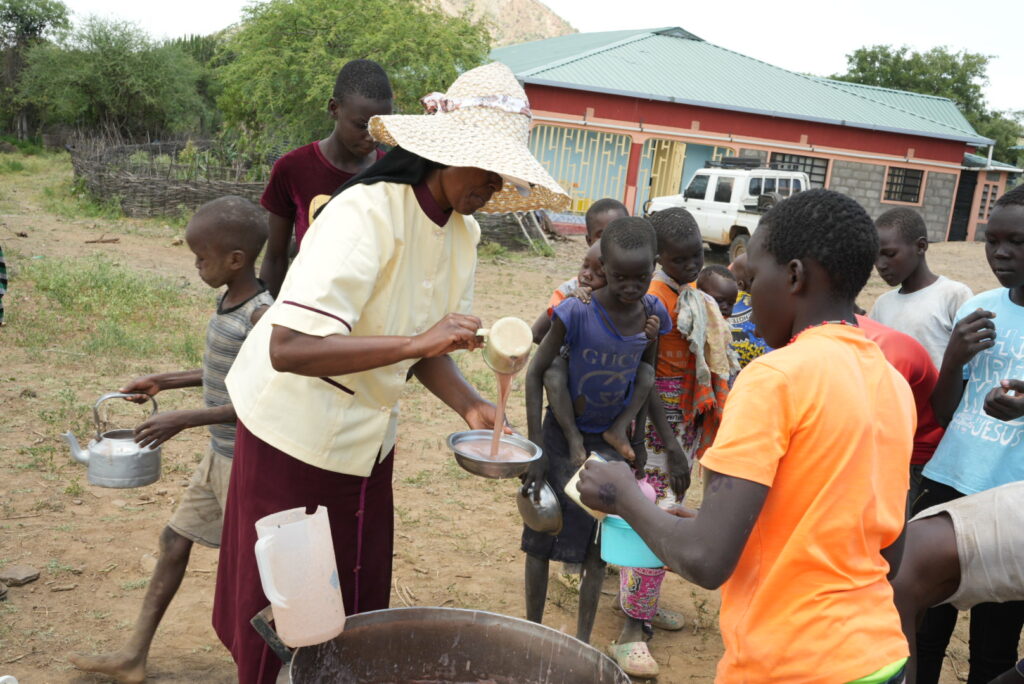
Sr. Jannifer Hiuhu serves porridge to children next to the East Pokot’s Incarnate Word Sisters’ convent. For most of these children who attend the congregation’s Rotu Primary School, the sisters’ “Porridge for Breakfast” initiative is their only meal of the day, as their nomadic families leave them at home in search of pasture amid a ravaging drought. (GSR photo/Wycliff Peter Oundo)
Religious sisters told Global Sisters Report that drought, poor infrastructure, limited access to health care, and limited access to markets for small-scale farmers and pastoralists are primary accelerators for hunger in northern Kenya. They also noted that banditry and insecurity — especially prevalent in the region — have exacerbated hunger, as bandits often steal food and livestock from local communities.
The Incarnate Word Sisters established a presence in Baringo County in 2011, led by Sr. Jaccen Rebekah, who is Mexican. More sisters followed through the years and established a permanent outpost, the Rotu Mission, in 2018.
For Hiuhu, “it was evident that we were the first resort for the community whenever hunger struck,” said the 52-year-old former teacher, who joined the mission in 2020. “We had to implement programs such as Food for Women and the Elderly, Porridge for Breakfast, Honey for Money, Food for Work, and Education against Ignorance.”
Today Rotu Mission includes a congregational house, a community hostel, a primary school and a clinic. Together with about three Holy Ghost Fathers, they wade deeply into the weeds of hunger, ignorance and insecurity.
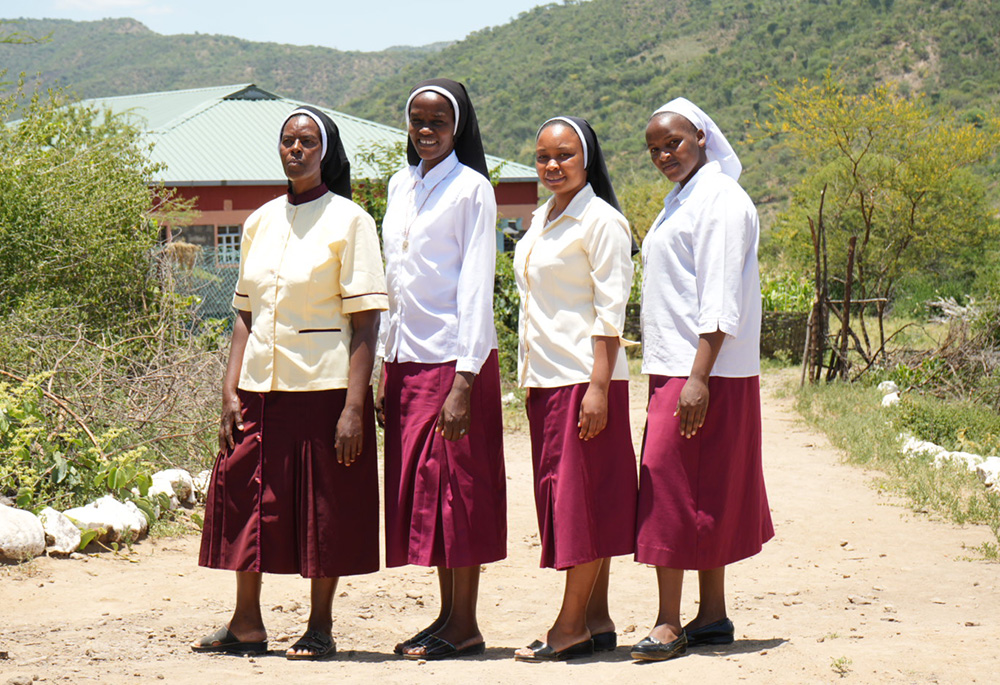
From left: Incarnate Word Srs. Jannifer Hiuhu, Phelomena Nyambu, Annestacia Wanza, and Aquilina Munyao in front of their convent in Rotu, a semiarid village in East Pokot, Baringo County. Hiuhu is the community superior, Nyambu is the acting head teacher of the Rotu Primary School, Wanza is in charge of the Association of Volunteers in International Service nonprofit’s East Pokot program, and Munyao is a novice sister and teacher at the Rotu Primary School. (GSR photo/Wycliff Peter Oundo)
Aid programs and advocacy
At a makeshift church in the remote village of Barpello, the sight of the mission’s truck is received with ululations and cheers. The congregants here are mostly women, with only a handful of men.
Incarnate Word Sr. Annestacia Wanza, also with the Rotu Mission, said Sundays are always dedicated to the program that gives women and the elderly food and other relief items to share with family members.
“Pokot traditions have it that women are the breadwinners; they gather food while the men protect their families and livestock,” said Wanza as she offloaded dry foods from the truck. “Before distributing the food, we have to evangelize. Today since the priests are attending Mass elsewhere, it is up to us to lead the service.”

Incarnate Word Sr. Jannifer Hiuhu leads the Sunday service at a makeshift church in Sugut village, located about 40 kilometers (about 25 miles) from the sisters’ outpost in Rotu village. In the absence of the three Holy Ghost Fathers who scatter throughout East Pokot to serve Mass, the sisters take on the responsibility of leading the Sunday service. Afterward, they distribute food aid to women and the elderly who are the most vulnerable to starvation from the drought. (GSR photo/Wycliff Peter Oundo)
The Sunday service presents the sisters an opportunity to educate the traditionalist Pokot community on contemporary agricultural solutions tailored to their pastoralist lifestyle, including participating in the government’s beef farming and livestock offtake program under the Kenya Meat Commission. They also advocate for social and financial welfare, the dangers of harmful practices such as female genital mutilation, or FGM, and preach reconciliation between warring factions to end banditry.
Afterward, the men help the nuns maintain order as the women jostle impatiently with tins and sacks to receive the rations. Holy Ghost Fr. Tom Siangu, ministering at Barpello Catholic Mission in Barpello Village, said the Food for Women and the Elderly program specifically aims to assist senior women most vulnerable to starvation after their husbands acquire younger wives and abandon them.
“The food aid being distributed by the sisters is a lifeline that needs to be replaced with long-term measures,” said Siangu, praising the sisters’ education programs as future-proof. “About 5,000 people in the village I minister directly depend on church relief programs. Therefore, what the sisters are implementing regarding education and financial empowerment will help reduce these numbers in the long run.”
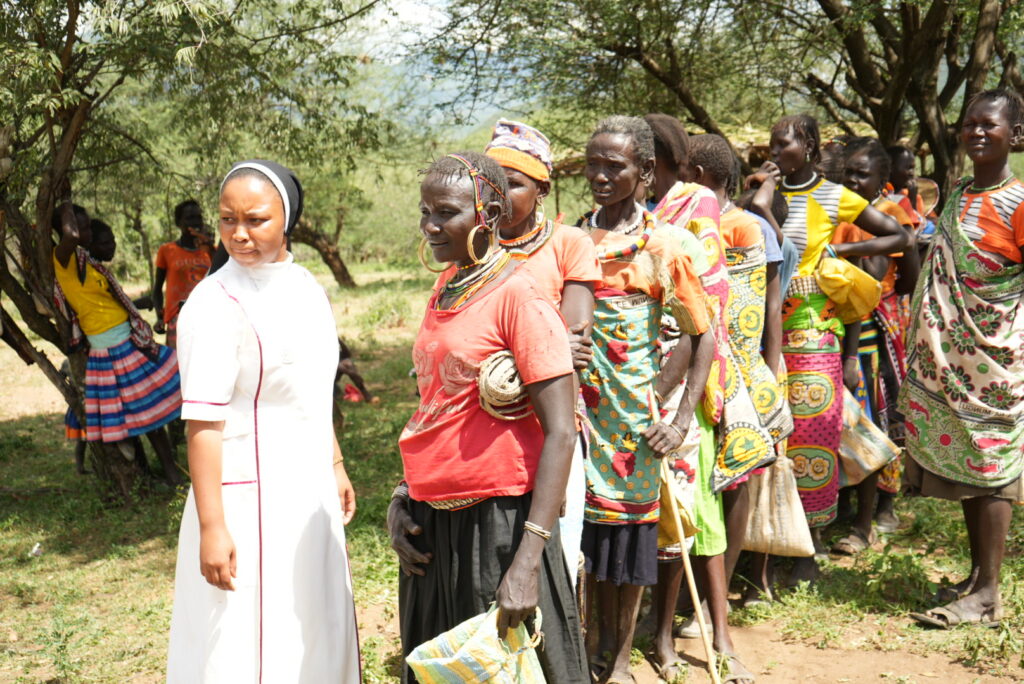
Sr. Annestacia Wanza oversees a line of senior women waiting eagerly with sacks for their supplies of maize rations. The “Food for Women and Elderly” initiative by the Incarnate Word Sisters caters to the most susceptible group to starvation, as many of them cannot keep up with the nomadic lifestyle of the Pokot people given their age. (GSR photo/Wycliff Peter Oundo)
Educating the future generation
The Porridge for Breakfast program is the congregation’s solution to low attendance levels at their Rotu Primary School, especially among Pokot teenage girls who are susceptible to early marriages. Baringo County, for example, where most Pokot live, has a high rate of child marriages at 20% and female genital mutilation at 29%, according to a report by Kenya’s National Council for Population and Development.
“When the girls are in school, we can keep records and report to officials when they drop out of school because of FGM or marriage,” said Sr. Phelomena Nyambu, the acting head teacher of Rotu Primary School, which is under the management of the Rotu Mission. “That is why the porridge program is important. Without it, dropouts skyrocket — especially when hunger strikes. I have witnessed children pass out in class from hunger. It is a terrible sight.”
Nyambu said the yearly droughts and hunger affect school attendance in the arid region: With 130 pupils, numbers fluctuate depending on the seasons. During drought seasons, for example, families move with their school-going children from one place to another, looking for water and pasture.
“The school aims to transition into a boarding school so that students can continue learning even as their families move around in search of pasture,” said Nyambu.
The program also protects teenage boys from being recruited into banditry.
“An idle Pokot boy will soon find indulgence in banditry. Staying in school saves them from the vicious circle of violence and arrogance, which is synonymous with banditry,” she added.
Journey to self-sufficiency
The congregation believes community education is the key to transforming the Pokot community and others to self-sufficiency. The school not only educates the pupils, but also offers sessions for the parents, teachers, and neighboring communities through the Association of Volunteers in International Service, or AVSI, a nongovernmental organization that works with sisters to promote financial literacy in rural Pokot. They also train the locals in modern drought-resistant farming methods, sanitation, and hygiene, as well as work to improve educational access by offering scholarships to underprivileged students.
Wanza, the coordinator for the Association of Volunteers in International Service, said the organization aims to ensure women have “fallback plans” to reduce dependency on pastoralism.
“If women have access to multiple sources of income, such as beekeeping and honey refining, they can afford to feed their families,” she said. “To boost the profitability of the beekeeping venture, the congregation buys the honey their women groups produce and sources buyers for it in the cities.”
The congregation has also drilled boreholes in various villages and schools across the region to ease access to clean water. Residents, especially women, and girls, normally walk for many miles in search of water for their livestock and domestic use.
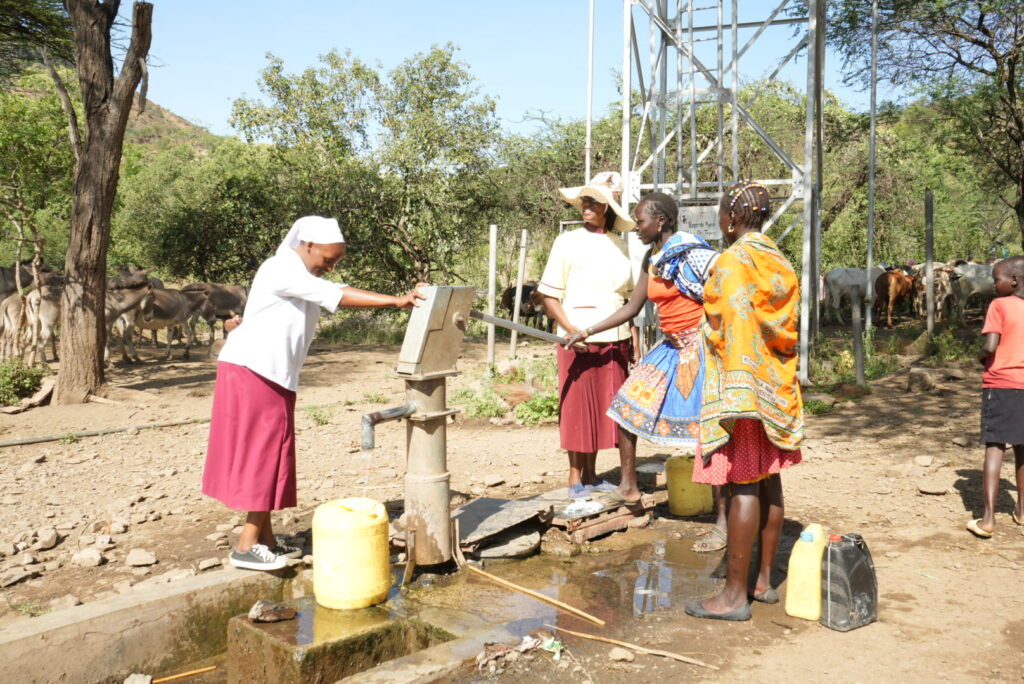
Srs. Aquilina Munyao and Jannifer Hiuhu inspect a borehole that the church drilled for the Rotu village. The community protects and maintains the borehole, the only water source for families and their flocks. The congregation is advocating for more water sources, which would allow the nomadic Pokot people to settle in villages and inspire urbanization in these rural communities. (GSR photo/Wycliff Peter Oundo)
Women also practice table banking groups, where 15 to 25 members use the group-based strategy to save and borrow money immediately during weekly or monthly meetings.
Mary Tireng is one of the beneficiaries of the sisters’ projects. The sisters employ her as a translator for their outreach programs, and her two children are on scholarship at the mission’s school. The 40-year-old said the sisters have also recruited her into AVSI women’s financial and self-sufficiency classes, enabling her to clothe and feed her children while achieving one of her biggest goals: building a house.
Tireng envisions a future where Pokot women and their families are no longer plagued by insecurity, overreliance on pastoralism, and food aid. “The reason we kill each other when we get hungry is because of the little flock we have,” said the mother of eight, stressing the importance of modern and alternative ways of making a living.
“Our table banking group has empowered us to own livestock and venture into honey refining,” she added. “Some of us no longer beg for food. The future of the Pokot people is where every man and woman is free from poverty and reliance on aid.”
By Doreen Ajiambo & Wycliff Peter Oundo
Published on the Global Sisters Report website


